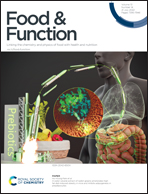Arabinoxylan from rice bran protects mice against high-fat diet-induced obesity and metabolic inflammation by modulating gut microbiota and short-chain fatty acids
Abstract
Rice bran is an important by-product of the milling industry. Arabinoxylan extracted from rice bran (RAX) is available in large quantities and is structurally different from other arabinoxylans from cereals. The anti-obesity effects of RAX and the role of microbiota have not been studied. In this work, we investigated the beneficial effects of RAX in C57BL/6J mice fed a high-fat diet (HFD). We found that supplementation of RAX significantly ameliorated HFD-induced obesity. RAX decreased HFD induced lipid accumulation and regulated genes related to hepatic fatty acid metabolism. Regulated lipid metabolism is associated with reduced systemic inflammation as indicated by TNF-α and IL-6. RAX normalized the gut microbiota and its major metabolites short-chain fatty acids (SCFAs). RAX restored the alpha diversity of the gut microbiota and increased the relative abundance of anti-inflammatory bacteria including Bifidobacterium and Akkermansia. RAX decreased pro-inflammatory bacteria including Anaerotruncus, Helicobacter, Coprococcus, and Desulfovibrio. Our results suggest that systemic inflammation bridges to the gut microbiota through LPS and SCFAs. RAX modulates the gut microbiota and SCFA production in the large intestine, thereby reducing systemic inflammation and ameliorating obesity. In brief, RAX prevented obesity through a mechanism related to the modulation of the microbiota and its metabolites.



 Please wait while we load your content...
Please wait while we load your content...